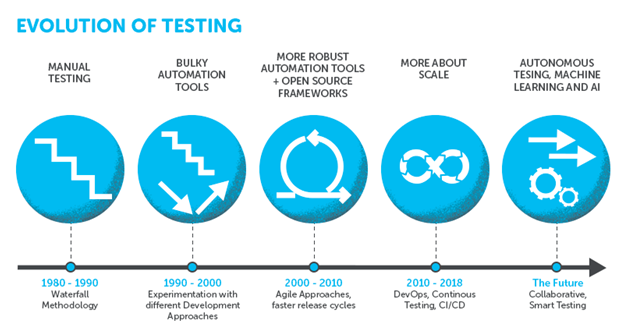In the present era, User experience is one of the decisive factors which can strongly affect the success of every online store. E-commerce platforms such as Magento, Salesforce Commerce Cloud etc. must focus on making sure that their users’ experiences are positive else it is likely that they will leave and never come back. Thus, testing is of prime importance to maintain the integrity of the E-commerce system and drive superior customer experience.
However, in today’s world, testing cannot be efficient without automation. E-commerce developers need automation for avoiding repetitive work, making sure that the time from development to deployment is reduced with good quality. Hence they depend on reliable automation and regression test suite. Though all the areas of the development lifecycle have seen a fair share of automation in terms of Dev-Ops, CI/CD (Continuous Integration/ Continuous Deployment), Test automation, etc. there is also huge scope to make this automation more effective.
With the advent of AI in the Retail domain, there has been a considerable change in the functioning of testing tools and test automation frameworks.
- AI emerged as enterprise technology within the retail domain a couple of years ago, however, applying AI techniques to E-commerce site testing started to just become feasible in the recent past.
- AI plays a major role in automating repeatable mundane tasks like regression testing etc. and streamlining automation testing procedures for enhanced results.
- AI can also help in the analysis of metrics and can do predictive analysis of the existing test cases and create new test execution. Based on this info, the estimation of testing and testing efficiency will be improved.
Source: testim.io
Different types of E-commerce Testing:
The better the site, the better the business. All the e-commerce platforms (ex: Magento Commerce Cloud, SFCC E-commerce Solution etc.) are subjected to different types of tests in order to ensure smooth functioning. It is important to test e-commerce websites and mobile applications so that it won’t compromise on various crucial factors such as user experience, mobile responsiveness, customer data security, quick load time, and secure transaction. It must be holistic in view and cover multiple areas such as functional, usability, security, performance, etc. However, to enhance testing, AI can be leveraged.
Just a delay of about 250 milliseconds of a page load time, is what it might take your customer to a competitor.
1) Performance testing (PT) needs to be:
- Performed early in the development cycle to ensure a smoother customer experience
- Comprehensive and structured
- Centric to variables, scenarios to test and must analyze the right data, for example, making sure the website is tested during peak shopping hours, season sales
2) Regression testing can be carried out either manually or through automation. When code changes are frequent then it is recommended to go automation which is the case for most of the current digital commerce sites.
3) User interface (UI) testing is notoriously difficult due to the underlying code constantly being changed during development. Also it takes a lot of time to run UI testing scripts. These updates make objects hard to find, test design brittle and ultimately, cause the tests to break.
4) Functional Testing: Proper functional testing is about ensuring that your application meets its requirements. Testing basic features such as menus, links, and forms; Complex features like database connections, vendor or seller integrations or partner integrations and other shopping cart functionality, Order processing etc. come under functional testing.
5) A/B Testing is a method of determining which design, content or functionality is more successful with your site visitors. It allows you to test a variation of your page (or element on a page) that may affect your consumer’s behavior. For example, it can involve testing two different content layouts for the same product to see which layout produces more sales.
Role of AI in enhancing Ecommerce Testing:
- AI can be leveraged to write performance scripts using Natural Language Processing (NLP) can make the scripting task way easier. Computers learn from the data given to them without programming it.
- An AI-enabled testing platform can discover changed controls more efficiently than a human, and with constant updates to its algorithms, even the slightest elementary changes (like change in element’s text or position), can be observed which in turn will increase the robustness of the testing suites.
- AI will speed up delivery cycles and team efficiency by reducing much of the manual effort needed to evaluate and build frameworks, and will help to identify which application controls or properties are required and provide recommended outputs for new test cases and new test designs.
Source: TestingXperts
Saved Time + Money = Faster time to Market
While AI-based testing is going to be smarter as it automates software testing, there is still a need for progress in implementing the AI-assisted testing effectively for a business. AI today automates testing activities based on the data provided by human testers. So, human testers need to understand the significance of their ideal role, to be the Automator and leverage AI-based automation techniques that will shape the future of software testing in various or all aspects of the testing.
- How SFCC Helps its Users Maintain Customer Loyalty and Trust by Staying Compliant to Privacy Laws - September 14, 2021
- 3 status update measures on Salesforce Trust Site - September 13, 2021
- 8 great insights retailers gain from SFCC’s Reports & Dashboards App - September 7, 2021








Comments